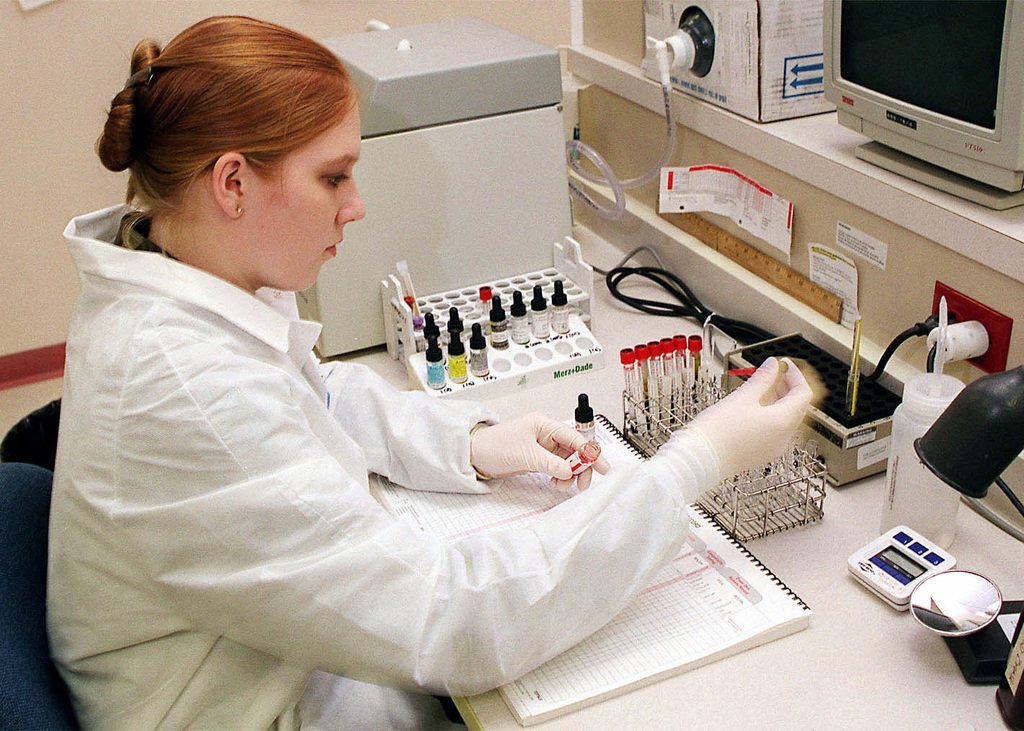A revised version of a proposed rule to alter VA medical rules and set requirements for VA clinical labs has been adopted as final. Clinical laboratories that perform testing for the identification, prevention, or management of any disease or impairment of, or the assessment of human health, must adhere to standards set forth by the Department of Health and Human Services (HHS). The VA must work with HHS to create regulations that are on par with those governing other clinical laboratories. This regulation formalizes the longstanding policy and practice by which VA laboratories adhere to HHS requirements. In this final regulation, proposed wording has been revised to more appropriately represent the fact that the VA uses CMS-deemed accredited bodies to carry out inspections, monitoring, and operational approvals of VA clinical laboratories, in response to comments from the public.
Common Clinical Laboratory Services Offered by VA Community Care Providers
Sampling Blood and Conducting Tests
Clinical laboratory testing and blood collection are two of the most common procedures given by VA Community Care Providers. Blood, urine, and other body fluid samples are collected from patients, and then laboratory tests are run to interpret the data. Infections, anemia, and cancer are just some of the many diseases that may be diagnosed with the use of this service.
Radiological Testing for Diagnosis
Clinical laboratories staffed by VA Community Care Providers offer additional diagnostic imaging services, including X-rays, MRIs, and CT scans. Fractures, cancers, and cardiovascular disease can all be diagnosed and monitored with the use of imaging studies.
Blood Donation Centers
Safely exchanging one person’s blood or blood product for another is what transfusion services are all about. Clinicians from the VA Community Care System work to ensure that transfusions are safe by matching donors and recipients according to blood types.
Analysis of Microorganisms
Testing in the field of microbiology involves the investigation of microscopic organisms including bacteria, viruses, and fungus. Clinical laboratories staffed by VA Community Care Providers conduct a battery of microbiology tests to identify infections and other diseases caused by specific bacteria.
Genomic Analysis
Mutations in a person’s DNA that cause genetic illnesses can be detected through genetic testing. Clinical laboratories staffed by VA Community Care Providers provide genetic testing for the diagnosis of diseases such cystic fibrosis, sickle cell anemia, and Huntington’s disease.
Analytical and Diagnostic Procedures
One of the main things we do as VA Community Care Providers in Clinical Laboratories is conduct tests and analyses. Testing, analyzing, and interpreting samples and specimens all fall under this category. To do their jobs effectively and properly, these experts need training and experience with laboratory machinery and technology. To ensure the results are presented and understood correctly, they should also have great communication skills, the ability to operate in a team, and a keen eye for detail.
Sampling and Testing of Blood
Clinical laboratory services, including blood collection and analysis, are another typical service provided by VA Community Care Providers. Patients’ blood must be collected, labeled, and processed by them before testing may begin. They could also check the samples for malignancies of the blood or infections in the blood. They need to have experience with phlebotomy and other laboratory techniques to guarantee the quality of the samples they collect.
Analysis of Microorganisms
Microbiology testing may also be available from VA Community Care Providers at Clinical Laboratories. Bacteria, viruses, and fungus are just some of the microorganisms that may be identified and studied in this way. Culture and sensitivity testing are only two examples of the many laboratory methods that may be used to assess the kind of microbe and whether or not it is susceptible to a particular antibiotic. They need to keep things clean to stop the spread of disease and get reliable findings.
Examination of Body Fluids and Urine
VA Community Care Providers in Clinical Laboratories also frequently do urinalysis and other analyses of bodily fluids. They are the ones that take bodily fluid samples including urine, CSF, and blood to test for infections and other abnormalities. To get reliable findings, they need to understand how to use scientific equipment and have a keen eye for detail.
Quality Assurance in Medical Laboratories
Quality control services may also be offered by VA Community Care Providers working in Clinical Laboratories. This necessitates checking that all aspects of the laboratory, from apparatus to methods to employees, are up to par. They need to keep an eye on the machinery, test it often, keep detailed records, and make adjustments as needed. To further guarantee that laboratory personnel are adhering to best practices and maintaining the necessary standards, they may also provide training for those personnel.
How to Become a Community Care Provider for the VA in Clinical Laboratories
1. Obtain the Required Skills and Education
To become a community care provider for the VA in clinical laboratories, you must possess the necessary skills and education. A bachelor’s degree in medical technology or a closely related discipline is preferred by the majority of employers. In addition, a license or certification is required to operate as a medical laboratory technician.
2. Acquire a License
- GETTING A BACKGROUND CHECK
Before you can become a VA clinical laboratory community care provider, you must undertake a background check. The Florida Department of Business and Professional Regulation (DBPR) stipulates that applicants must use an authorized provider of electronic fingerprinting services to fulfill this requirement in the state of Florida. The Florida Electronic Fingerprinting Service (FEFPS) is among the most prominent approved suppliers.
- APPLYING FOR THE LICENSE
A license from the Florida Board of Clinical Laboratory Personnel is required to practice as a medical laboratory technologist. The application procedure entails submitting an application, paying the required fees, and providing evidence of your academic credentials and clinical laboratory experience.
- STUDYING FOR THE EXAM
After your application is accepted, you must prepare for and pass the American Society for Clinical Pathology (ASCP) certification exam for medical laboratory technologists. The scope of this examination includes clinical chemistry, hematology, microbiology, and immunology.
- GETTING LICENSED
After passing the exam, you will be granted a license to practice as a medical laboratory technologist in Florida. Ensure that your license is current by completing the state-mandated continuing education requirements.
3. Gain Clinical Experience
To qualify as a VA community care provider in clinical laboratories, you must also obtain clinical laboratory experience. The majority of employers require candidates to have at least one year of clinical laboratory experience prior to consideration.
4. Submit a VA Community Care Provider Program Application
Once you have met the requirements for education, licensure, and clinical experience, you can apply to the VA Community Care Provider Program to become a clinical laboratory VA community care provider. When VA facilities are unable to provide the necessary treatment, this program allows veterans to receive medical care from community providers.
5. Register with the VA Community Care Network
After acceptance into the VA Community Care Provider Program, you must register with the VA Community Care Network. This network enables community providers to coordinate care for veterans by communicating with VA providers.
6. Participate in Required Training
You will be required to participate in certain training programs as a VA community care provider to ensure that you provide veterans with high-quality care. The topics covered by these training programs include privacy and security, cultural competency, and medical documentation.
7. Provide Veteran Care
You can begin providing assistance to veterans through the VA Community assistance Provider Program once you have completed all the necessary procedures. The VA will reimburse you for your services at the rates it has established.
8. Keep Your Credentials Current
To continue working as a VA community care provider in clinical laboratories, you must maintain your credentials and remain abreast of the most recent advancements in the field. This may involve attending professional conferences or completing continuing education courses.
Conclusion
Veterans who are dedicated to helping their peers in the military might find rewarding work as clinical laboratory technicians with the VA. It is feasible to get the knowledge and training necessary to succeed in this sector with the help of the VA’s various educational perks. To be eligible for a license in Florida, however, candidates must first submit to a background check through a service recognized by the Florida Department of Law Enforcement (FDLE).
If you are a veteran interested in working in clinical laboratories for the VA as a community care provider, you need get your license and go through a background check with a reputable company. Doing so will guarantee that you satisfy the necessary qualifications and may begin assisting your fellow veterans as soon as possible.







